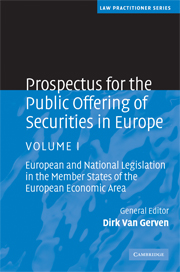 Prospectus for the Public Offering of Securities in Europe
Prospectus for the Public Offering of Securities in Europe Book contents
- Frontmatter
- Contents
- Contributors
- Preface
- Part I
- Part II Application in each Member State National reports for EU Member States
- 2 Belgium
- 3 Czech Republic
- 4 Denmark
- 5 Estonia
- 6 Greece
- 7 Hungary
- 8 Latvia
- 9 Lithuania
- 10 Luxembourg
- 11 The Netherlands
- 12 Poland
- 13 Portugal
- 14 Slovakia
- 15 United Kingdom
- Part III National reports for EEA Member States
- Part IV Annexes
- Index
2 - Belgium
from Part II - Application in each Member State National reports for EU Member States
Published online by Cambridge University Press: 18 December 2009
- Frontmatter
- Contents
- Contributors
- Preface
- Part I
- Part II Application in each Member State National reports for EU Member States
- 2 Belgium
- 3 Czech Republic
- 4 Denmark
- 5 Estonia
- 6 Greece
- 7 Hungary
- 8 Latvia
- 9 Lithuania
- 10 Luxembourg
- 11 The Netherlands
- 12 Poland
- 13 Portugal
- 14 Slovakia
- 15 United Kingdom
- Part III National reports for EEA Member States
- Part IV Annexes
- Index
Summary
Introduction
1. In Belgium, the Prospectus Directive has been implemented by the Act of 16 June 2006 on the public offering of securities and the admission of securities to trading on regulated markets (the ‘Prospectus Act’). The rules governing the publication of a prospectus in the event of a public offering of securities or a request for admission to trading on a regulated market are laid down in the Prospectus Act and the Prospectus Regulation. No other legislation or circulars have been issued by the national supervisory authority, the Commissie voor het Bank-, Financie- en Assurantiewezen/Commission bancaire, financière et des assurances (Banking, Finance and Insurance Commission) (‘CBFA’). The Prospectus Act entered into force on 1 July 2006.
2. Prior to implementation of the Prospectus Directive, the offering of securities was regulated by the Act of 22 April 2003 on the public offering of securities, the Royal Decree of 31 October 1991 on the prospectus to be published when securities are offered to the public, and the Royal Decree of 18 September 1990 on the prospectus to be published when securities are admitted to trading. This legislation has been, with respect to the public offering of securities and listing on a regulated market, abolished by the Prospectus Act.
3. The Prospectus Act goes beyond implementation of the Prospectus Directive. More specifically, the Prospectus Act distinguishes between harmonised transactions and non-harmonised transactions.
- Type
- Chapter
- Information
- Prospectus for the Public Offering of Securities in EuropeEuropean and National Legislation in the Member States of the European Economic Area, pp. 71 - 84Publisher: Cambridge University PressPrint publication year: 2008
